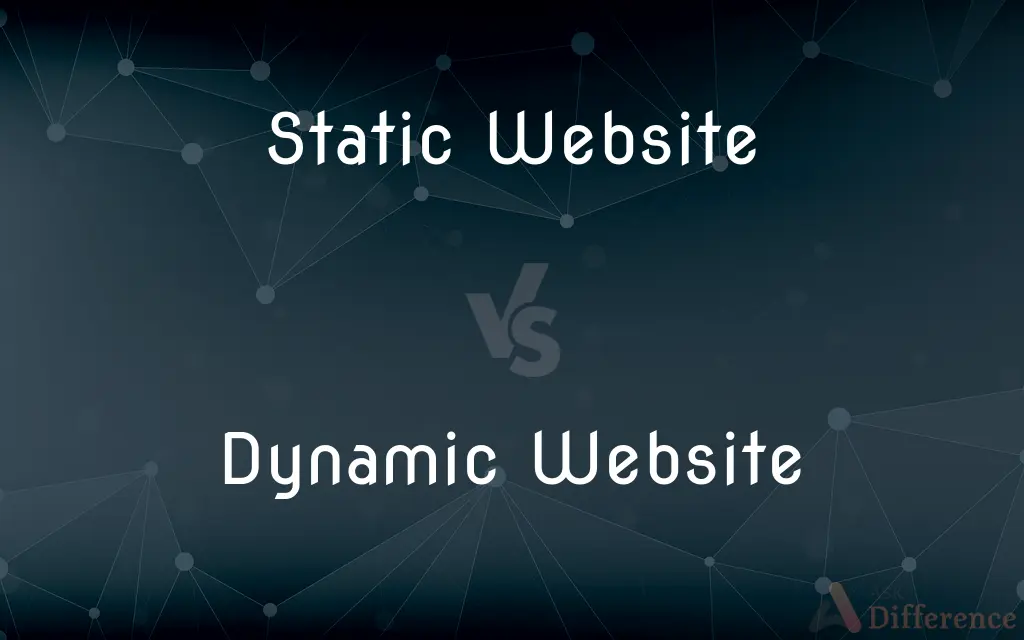Static Website vs. Dynamic Website — What's the Difference?
By Tayyaba Rehman & Urooj Arif — Published on February 1, 2024
A Static Website displays fixed content identical for every user, typically written in HTML, CSS, and JavaScript, while a Dynamic Website generates content in real-time, often using server-side scripting languages and databases.

Difference Between Static Website and Dynamic Website
Table of Contents
ADVERTISEMENT
Key Differences
Static Websites are characterized by fixed content, meaning the information displayed is the same for every user and visit. They are usually built using HTML, CSS, and JavaScript. In contrast, Dynamic Websites generate content in real-time, often based on user interactions or other criteria. They use server-side scripting languages like PHP, Python, or JavaScript frameworks to dynamically generate content.
Static Websites are simpler and faster to load because they consist of fixed code files served directly to the user without any processing on the server. Dynamic Websites, however, are more complex and can be slower to load because they require server-side processing to generate the content for each user request, making them more resource-intensive.
In terms of maintenance, Static Websites are easier to maintain due to their simplicity and the absence of server-side processing. They are ideal for small websites with content that doesn’t change often. Dynamic Websites, on the other hand, require more maintenance due to their complex nature but are suitable for large websites with content that changes frequently, like e-commerce sites or blogs.
Static Websites are often considered more secure as they do not interact with databases or execute server-side scripts, reducing vulnerabilities. Dynamic Websites, with their server-side processing and database interactions, are more prone to security risks but offer enhanced functionality and interactivity.
Static Websites are often cheaper to host since they require less server resources. They are a good choice for businesses or individuals who need a simple online presence. Dynamic Websites, being resource-intensive, often require more expensive hosting solutions but are essential for businesses needing complex functionalities like user accounts, real-time data updates, and custom user experiences.
ADVERTISEMENT
Comparison Chart
Content Type
Fixed content, same for every user.
Content generated in real-time, often user-specific.
Technology Used
HTML, CSS, JavaScript.
Server-side languages like PHP, Python, JavaScript frameworks.
Loading Speed
Generally faster to load.
Can be slower due to server-side processing.
Maintenance and Security
Easier to maintain and more secure.
More complex maintenance and security considerations.
Hosting Costs
Usually cheaper due to less resource use.
Often more expensive due to higher resource requirements.
Compare with Definitions
Static Website
No real-time content updates.
Our event information is on a static website, so we update it manually before each event.
Dynamic Website
Generates content in real-time.
Our online store is a dynamic website, displaying different products based on user search.
Static Website
Built with HTML, CSS, and JavaScript.
I used only HTML and CSS to build my static website, which showcases my photography.
Dynamic Website
Custom content for each user.
Users receive personalized recommendations on our dynamic website.
Static Website
Displays the same content to every user.
The local restaurant’s static website provides the same menu to all online visitors.
Dynamic Website
Interacts with databases for content.
The job portal’s dynamic website pulls current openings from a database in real-time.
Static Website
A website with fixed content.
Our company's brochure site is a static website, displaying the same information to all visitors.
Dynamic Website
Uses server-side scripting.
The dynamic website for our community forum runs on PHP for interactive user discussions.
Static Website
Simple, without server-side processing.
For my portfolio, I created a static website that loads quickly and easily.
Dynamic Website
Suitable for complex functionalities.
Our dynamic website allows users to create profiles and interact with others.
Common Curiosities
What defines a dynamic website?
A dynamic website generates real-time, often user-specific content using server-side scripting and databases.
Are static websites more secure?
Generally, static websites are considered more secure as they lack server-side processing and database interactions.
What is a static website?
A static website displays fixed content, the same for every visitor, typically written in HTML, CSS, and JavaScript.
Can dynamic websites offer personalized content?
Yes, dynamic websites can offer personalized content based on user behavior or preferences.
Can static websites be updated easily?
Updating static websites requires manual changes to the code and is not as straightforward as dynamic websites.
Do dynamic websites require more maintenance?
Yes, due to their complexity and functionalities, dynamic websites require more maintenance.
Are static websites good for SEO?
Static websites can be SEO-friendly due to their faster load times and simpler structures.
Is it more expensive to host a dynamic website?
Yes, dynamic websites often require more resources, leading to higher hosting costs.
Are static websites faster than dynamic ones?
Yes, static websites generally load faster than dynamic websites as they serve pre-written content without server-side processing.
Is user login functionality possible on static websites?
User login and dynamic interactions are not possible on purely static websites.
Do static websites have limitations?
Static websites are limited in functionality, especially in interactivity and real-time content updates.
Are dynamic websites better for e-commerce?
Yes, dynamic websites are better suited for e-commerce due to their ability to handle complex transactions and real-time updates.
Can a static website include interactive elements?
While static websites are less interactive, they can include some interactivity with JavaScript.
How do dynamic websites handle content updates?
Dynamic websites handle updates through server-side scripting and database interactions, allowing real-time content changes.
Can static websites handle high traffic efficiently?
Yes, static websites can handle high traffic more efficiently as they require fewer server resources.
Share Your Discovery

Previous Comparison
Rajya Sabha vs. Vidhan Sabha
Next Comparison
.357 Magnum vs. .38 SpecialAuthor Spotlight
Written by
Tayyaba RehmanTayyaba Rehman is a distinguished writer, currently serving as a primary contributor to askdifference.com. As a researcher in semantics and etymology, Tayyaba's passion for the complexity of languages and their distinctions has found a perfect home on the platform. Tayyaba delves into the intricacies of language, distinguishing between commonly confused words and phrases, thereby providing clarity for readers worldwide.
Co-written by
Urooj ArifUrooj is a skilled content writer at Ask Difference, known for her exceptional ability to simplify complex topics into engaging and informative content. With a passion for research and a flair for clear, concise writing, she consistently delivers articles that resonate with our diverse audience.
















































